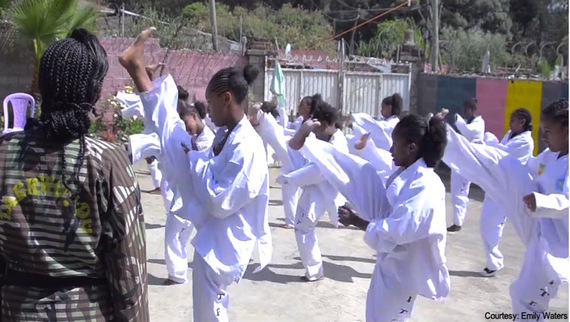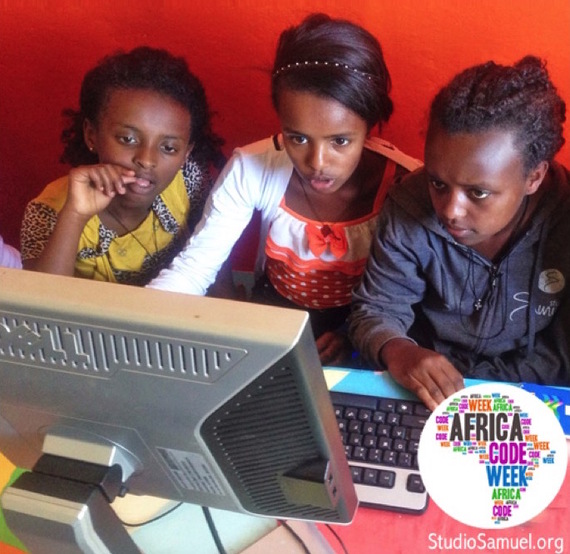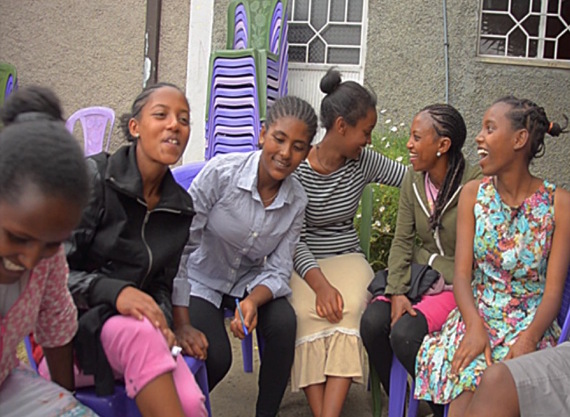Can you imagine living in a world where gender parity meant fighting through child marriage, human trafficking, child labor or a lack of access to education? The picture I'm painting is very real and highlights common barriers faced by girls enrolled at the training center of Studio Samuel, a non-profit that aims to help Ethiopian women and girls become self-reliant.

Martial arts provide self-defense skills and is a proven self-esteem builder. Photograph taken at the Studio Samuel training center during a karate lesson with girls in the Training for Tomorrow program.
Studio Samuel, a non-profit founded in 2012 by New York-based designer Tamara Horton, provides life skills to vulnerable young women and girls in Ethiopia through its flagship impact program Training for Tomorrow, which works with girls ages 9-18 in a local community in Addis Ababa. Central to the approach is "empowerment without pity." Studio Samuel aims to break the cycle of poverty with dignity - one girl at a time.

Computer programming offers 21st-century career opportunities in a global market. Pictured here are girls with Studio Samuel's Training for Tomorrow program participating in Africa Code Week.
The framework emphasizes the importance of education and Studio Samuel's training center provides the girls with a sense of community and a safe haven after school and on weekends. 94% of girls saw improvement in their behavior and/or academic performance within the first six months of entering the program. There also has been a 97% success rate in preventing trafficking and child marriage, which too often are the pathways of young girls in Ethiopia.
While addressing the hard topics and poverty-related realities these girls face, Studio Samuel consistently tells their stories through positive messaging, which is important to me as a supporter. Below is a short video filmed at their training center. It features a song by Julian Lennon, a Studio Samuel Advisor and one of the organization's many celebrity supporters.
I had a chance to meet up with Studio Samuel's New York City-based founder Tamara Horton and Skype with Hilawi Alemayehu, Studio Samuel Country Director based in Ethiopia. Here's what they told me about the important work they're doing.
Why Ethiopia and why women?
Tamara Horton: My husband and I adopted our son from Ethiopia. The seed was planted the first time I met him. I wanted to give back in some way and after seeing the struggles that poverty places on a family, particularly the girls, it was the place to start for me.
Tell me more about your Training for Tomorrow program.
Hilawi Alemayehu: The World Health Organization defines the Ten Core Life Skills as "the abilities for adaptive and positive behavior that enable individuals to deal effectively with the demands and challenges of everyday life." Training for Tomorrow creates a holistic approach when teaching the Ten Core Life Skills. Through counseling, mentoring, occupational training, life skills training, healthcare courses, entrepreneurial workshops and karate classes, our curriculum incorporates the thinking skills, social skills and emotional targets that encompass these core skills laid out by the World Health Organization. Studio Samuel's mantra, Empowerment without Pity, is aligned with this as well.
What has been Studio Samuel's biggest obstacle and accomplishment?
Hilawi Alemayehu: Ours is one and the same. It's our "teach a man to fish" business model that creates opportunity within the community by working alongside them, not over them. By creating together and not giving handouts, a foundation unfolds that may not have existed. It builds pride and accountability and, once welcomed, it is extremely impactful. At a recent community meeting at our center, an older woman stood to say, "Thank you for teaching our girls these skills and for not just giving them things." There was an immediate round of applause from this older generation of women, showing their support of our model. That will always be a memorable turning point.
Introduce me to your girls. What should I know?
Tamara Horton: Take any 9-18 year old girl you know or one you see throughout the day hanging out with her friends after school, on the playground, etc. That's our girl, but she happened to be born into poverty. She has the same pre-teen and teenage energy, thoughts and mindset. The differences are the barriers she faces at this age, moving into adulthood. We've seen girls forced into early marriage, pulled from school to work at home or sent abroad to work, typically in dangerous situations. Many girls lack proper feminine hygiene supplies, keeping them home during their periods. This leads to a high spike in the dropout rate of girls advancing from primary to secondary school. These are the most pivotal years in our girls' lives, with her current choices and options determining her future. The first step is a girl knowing her value and that she can break her poverty cycle.
To learn more about this great organization and the important work they do, visit StudioSamuel.org.

